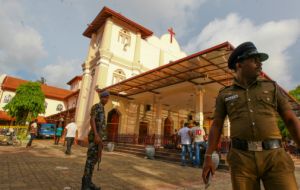MercoPress. South Atlantic News Agency
Easter carnage in Sri Lanka: bomb attacks kill 207 and injure at least 450
 The attacks weretargeted at high-end hotels in Colombo and churches where worshippers were attending Easter services
The attacks weretargeted at high-end hotels in Colombo and churches where worshippers were attending Easter services  There was no immediate claim of responsibility but the government said 13 people had been arrested in connection with the bomb blasts
There was no immediate claim of responsibility but the government said 13 people had been arrested in connection with the bomb blasts The Sri Lankan government has imposed a nationwide curfew after a string of bomb blasts at churches and hotels on Sunday that left 207 dead, including 35 foreigners, and at least 450 injured people have been admitted to hospital, police spokesman Ruwan Gunasekera told reporters in Colombo.
The attacks were mostly targeted at high-end hotels in the capital and churches where worshippers were attending Easter services. Social media access has also been curbed to restrict “wrong information” spreading in the country of 21 million people.
There was no immediate claim of responsibility but the government said 13 people had been arrested in connection with the bomb blasts.
Prime Minister Ranil Wickremesinghe said “so far the names that have come up are local,” but that investigators would look into whether the attackers had any “overseas links”.
Mr Gunasekera said the police were investigating whether suicide bombers were involved in all of the blasts.
In a video on his Twitter account, Sri Lanka's State Minister for Defence Ruwan Wijewardene said the country's Criminal Investigations Department is working with the police and the military to investigate the attacks.
“We believe that all the culprits who have been involved in this unfortunate terrorist incident will be taken into custody as soon as possible,” he said, adding that suspects have been identified.
Documents show that Sri Lanka's police chief Pujuth Jayasundara issued an intelligence alert to top officers 10 days ago, warning that suicide bombers planned to hit “prominent churches”.
”A foreign intelligence agency has reported that the NTJ (National Thowheeth Jama'ath) is planning to carry out suicide attacks targeting prominent churches as well as the Indian high commission in Colombo,“ the alert said.
The NTJ is a radical Muslim group in Sri Lanka that was linked last year to the vandalization of Buddhist statues.
Prime Minister Ranil Wickremesinghe acknowledged that ”information was there“ about possible attacks and that an investigation would look into ”why adequate precautions were not taken”.
Ethnic and religious violence has plagued Sri Lanka for decades, with a 37-year conflict with Tamil rebels followed by an upswing in recent years in clashes between the Buddhist majority and Muslims.
Catholics make up around six per cent of the island nation's population, which is a patchwork of different religious and ethnic groups dominated by Buddhist Sinhalese.
While there have been attacks on Christians, their community had been left relatively unscathed until now.
Eight explosions in hotels and churches were reported on Sunday. A police official said at least 45 people had been killed in Colombo, where three hotels and a church were hit.
Another 67 were killed in an attack on a church in Negombo, north of the capital, with another 25 dead at a church in the town of Batticaloa, in the east of the country.
The first explosions were reported at St Anthony's Church in Colombo and St Sebastian's in the town of Negombo just outside the capital.
At least 160 people injured in the St Anthony's blast had been admitted to the Colombo National Hospital by mid-morning, an official reported.
Shortly after those blasts were reported, police confirmed three hotels in the capital had also been hit, along with a church in the town of Batticalao, in the east of the country.
At least one of the victims was killed in Colombo's Cinnamon Grand Hotel, near the prime minister's official residence, where the blast ripped through a restaurant.
An official at the Batticaloa hospital said more than 300 people had been admitted with injuries following the blast there.
On Sunday afternoon, police confirmed there were two more blasts in the capital.
The first of the two new blasts was reported in a hotel in the southern Colombo suburb of Dehiwala and killed at least two people, police said. The hotel was reportedly located near the national zoo.
The second was in the suburb of Orugodawatta in the north of the capital, although there were no further details on what was targeted and the number of people injured.




Top Comments
Disclaimer & comment rulesCommenting for this story is now closed.
If you have a Facebook account, become a fan and comment on our Facebook Page!